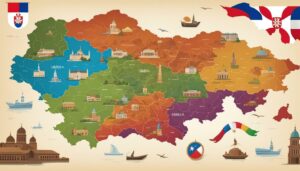What language do they speak in Hungary
Hungary is a Central European nation with a fascinating linguistic landscape, but what language do they speak in this country? The official language of Hungary is Hungarian, also known as Magyar language. It is spoken by the majority of the population and holds a significant cultural and historical importance in the country.
Key Takeaways:
- Hungarian is the official language of Hungary
- It is also known as Magyar language
- Hungary recognizes and protects minority languages such as Armenian, Boyash, Bulgarian, Croatian, German, Greek, Polish, Romani, Romanian, Rusyn, Serbian, Slovak, Slovenian, and Ukrainian
- English is widely spoken as a foreign language by about 40% of the population in Hungary
- Language apps like Google Translate can help overcome the language barrier when visiting Hungary, but for official translations and visa applications, it is advisable to hire a professional translator
So, whether you are planning a trip to Hungary or simply curious about the linguistic diversity of this captivating country, understanding the importance of the Hungarian language and its role in shaping the cultural fabric of Hungary is essential. With a little help from modern language communication tools, such as language apps, you can easily navigate your way through this beautiful Central European nation.
Hungarian language: History and Origins
The Hungarian language has a rich history and fascinating origins that trace back to the Finno-Ugric language family. It is a unique and distinct language within this linguistic group, with its roots in the Uralic language family, which includes languages spoken in Northern Russia and Siberia.
Through centuries of development and influence, Hungarian has evolved into its own distinct language, with its own grammar and phonetics. It is the official language of Hungary and is spoken by the majority of the population. The Hungarian language has also influenced neighboring languages in the region, such as Slovak, Romanian, and Serbian.
One interesting characteristic of the Hungarian language is its lack of significant similarities to other European languages. This can make it challenging for speakers of Indo-European languages, such as English or German, to learn Hungarian. However, it also adds to the uniqueness and allure of the language.
The Origin of Hungarian: A Linguistic Journey
The Hungarian language shares its roots with other Finno-Ugric languages, which include Finnish, Estonian, and several indigenous languages spoken in the Arctic regions of Russia. These languages form a distinct branch of the Uralic language family, separate from the Indo-European languages spoken in most of Europe.
The ancestors of the Hungarian people are believed to have migrated to the Carpathian Basin, the region where Hungary is located, around the 9th century. Over time, these settlers assimilated with the local population and formed the Hungarian nation. The Hungarian language, with its roots in the Uralic language family, became the main language spoken in the region.
Today, Hungarian stands as a testament to the linguistic diversity and cultural heritage of Hungary. It continues to be a source of pride for Hungarians and a symbol of their unique cultural identity.
| Language | Language Family | Percentage of Speakers |
|---|---|---|
| Hungarian | Uralic | 100% |
| Armenian | Indo-European | 0.8% |
| Boyash | Indo-European | 0.3% |
| Bulgarian | Indo-European | 0.2% |
| Croatian | Indo-European | 0.4% |
| German | Indo-European | 1.2% |
| Greek | Indo-European | 0.4% |
| Polish | Indo-European | 0.3% |
| Romani | Indo-Aryan | 3.2% |
| Romanian | Italic | 0.8% |
| Rusyn | Slavic | 0.1% |
| Serbian | Slavic | 0.9% |
| Slovak | Indo-European | 0.6% |
| Slovenian | Slavic | 0.4% |
| Ukrainian | East Slavic | 0.2% |
Hungarian Language: Characteristics and Dialects
The Hungarian language is known for its complex grammar, distinctive phonetics, and a variety of dialects spoken across different regions of Hungary. Let’s dive deeper into the fascinating characteristics that make Hungarian unique.
Complex Grammar
Hungarian grammar can be quite challenging for non-native speakers. Unlike English, which relies on word order to convey meaning, Hungarian uses a system of suffixes to indicate grammatical relationships. These suffixes are added to the end of words, allowing for flexibility in sentence structure.
For example, in Hungarian, a simple sentence like “I am going to the store” would be expressed as “Megyek az üzletbe,” where the word “megyek” means “I am going,” and the suffix “-be” indicates the direction “to.”
Distinctive Phonetics
The Hungarian language has its own unique set of phonetic sounds that can sometimes be challenging for non-native speakers to pronounce. One notable feature is the presence of vowel harmony, which means that the vowels in a word must follow a specific pattern.
For instance, if a word contains front vowels like “e” or “i,” then all the vowels in that word must also be front vowels. Similarly, if a word contains back vowels like “a” or “o,” then all the vowels must be back vowels. This creates a harmonious and consistent sound pattern throughout the language.
Dialects
Due to Hungary’s diverse geographical and historical background, several dialects of Hungarian have developed over the years. These dialects vary in pronunciation, vocabulary, and grammar, reflecting the cultural and regional differences within the country.
Some prominent dialects include the Transylvanian dialect, spoken in the Transylvania region of Romania, which has been heavily influenced by Romanian; the Szekler dialect, spoken by the Szekler minority in Transylvania; and the Palóc dialect, spoken by the Palóc ethnic group in Northern Hungary.
| Dialect | Region | Characteristics |
|---|---|---|
| Transylvanian | Transylvania, Romania | Influenced by Romanian |
| Szekler | Transylvania, Romania | Spoken by the Szekler minority |
| Palóc | Northern Hungary | Spoken by the Palóc ethnic group |
These dialects add further richness to the Hungarian language, showcasing its cultural diversity and historical heritage.
Official Language and Minority Languages in Hungary
Hungarian holds the official language status in Hungary, but the country also recognizes and protects several minority languages spoken within its borders. These minority languages are an important part of Hungary’s diverse cultural landscape. Among the recognized minority languages are Armenian, Boyash, Bulgarian, Croatian, German, Greek, Polish, Romani, Romanian, Rusyn, Serbian, Slovak, Slovenian, and Ukrainian.
It is worth noting that these minority languages are not only spoken by specific ethnic groups, but they also contribute to the preservation of their respective cultures and traditions. The Hungarian government has taken steps to ensure the protection and promotion of these minority languages, including providing educational resources and official recognition.
While Hungarian remains the dominant language in most regions of Hungary, the presence of these minority languages adds another layer of linguistic diversity to the country. Visitors to Hungary may encounter individuals who speak these minority languages, especially in areas where these communities are concentrated. This diversity is a testament to Hungary’s commitment to preserving its cultural heritage.
| Minority Language | Significance |
|---|---|
| Armenian | Spoken by the Armenian community in Hungary |
| Boyash | Spoken by the Boyash community in Hungary |
| Bulgarian | Spoken by the Bulgarian community in Hungary |
| Croatian | Spoken by the Croatian community in Hungary |
| German | Spoken by the German community in Hungary |
| Greek | Spoken by the Greek community in Hungary |
| Polish | Spoken by the Polish community in Hungary |
| Romani | Spoken by the Romani community in Hungary |
| Romanian | Spoken by the Romanian community in Hungary |
| Rusyn | Spoken by the Rusyn community in Hungary |
| Serbian | Spoken by the Serbian community in Hungary |
| Slovak | Spoken by the Slovak community in Hungary |
| Slovenian | Spoken by the Slovenian community in Hungary |
| Ukrainian | Spoken by the Ukrainian community in Hungary |
English as a Foreign Language and Language Barrier
English is widely spoken as a foreign language in Hungary, with around 40% of the population having the ability to communicate in English. This makes it easier for tourists and visitors to navigate the country and interact with locals. Whether you’re exploring the stunning architecture of Budapest or taking a trip to the countryside, knowing English can be a valuable asset.
To facilitate communication further, there are various language apps available, such as Google Translate, which can help overcome the language barrier. These apps provide instant translations between English and Hungarian, allowing you to communicate with locals, read signs, and understand menus. They are especially handy for quick translations on the go.
However, when it comes to official translations and important documents like visa applications, it is recommended to hire a professional translator. Machine translation may not always provide accurate results, and it’s crucial to have precise and reliable translations for legal or formal purposes. Professional translators ensure that your documents are accurately translated, meeting the required standards and legal requirements.
In conclusion, English is widely spoken as a foreign language in Hungary, making it easier for travelers to communicate. However, it’s essential to use language apps responsibly and consult professional translators for important documents to ensure accuracy and avoid any misunderstandings.
Conclusion
In conclusion, Hungary is a linguistically diverse country where Hungarian takes center stage as the official language, but several minority languages also find their place within its borders. Hungarian, also known as the Magyar language, is spoken by the majority of the population and holds the status of the official language of Hungary. However, the country also recognizes and protects a variety of minority languages, including Armenian, Boyash, Bulgarian, Croatian, German, Greek, Polish, Romani, Romanian, Rusyn, Serbian, Slovak, Slovenian, and Ukrainian.
English is widely spoken by approximately 40% of the population as a foreign language. This makes it easier for tourists visiting Hungary to communicate with locals, especially in major cities and tourist destinations. For basic communication needs, language apps like Google Translate can be helpful in overcoming the language barrier. These apps provide instant translations and allow users to have basic conversations with locals even if they don’t speak Hungarian.
However, when it comes to official translations and visa applications, it is recommended to hire a professional translator. Machine translation may not always be accurate enough for legal or important documents, and it is crucial to have precise translations in such cases. Professional translators ensure that the meaning, context, and legal requirements are accurately reflected in the translated documents, providing a reliable and trustworthy service.
So, whether you are planning to visit Hungary for business or pleasure, be prepared to experience the linguistic richness of the country. From the melodic Hungarian language to the diverse range of minority languages, Hungary offers a truly unique linguistic landscape that adds to its cultural identity and charm.
FAQ
What language do they speak in Hungary?
The official language of Hungary is Hungarian, also known as Magyar. It is spoken by the majority of the population in the country.
Are there any minority languages recognized in Hungary?
Yes, Hungary recognizes and protects several minority languages. These include Armenian, Boyash, Bulgarian, Croatian, German, Greek, Polish, Romani, Romanian, Rusyn, Serbian, Slovak, Slovenian, and Ukrainian.
Can English be used as a foreign language in Hungary?
Yes, English is commonly spoken as a foreign language in Hungary, with approximately 40% of the population being able to communicate in English.
How can tourists overcome the language barrier in Hungary?
When visiting Hungary, tourists can use language apps like Google Translate to overcome the language barrier and communicate with locals.
Is machine translation accurate enough for official translations and visa applications?
It is recommended to hire a professional translator for official translations and visa applications in Hungary, as machine translation may not be accurate enough for these important matters.
Source Links
- https://www.universal-translation-services.com/what-language-to-they-speak-in-hungary/
- https://en.wikipedia.org/wiki/Languages_of_Hungary
- https://en.wikipedia.org/wiki/Hungarian_language

